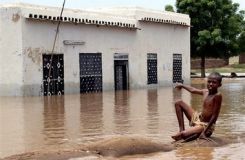Floods kill 27, damage 10,000 houses in Sudan
Aug 23, 2006 (KHARTOUM) — Floods and heavy rain have killed at least 27 people and damaged about 10,000 homes in Sudan, the Interior Ministry and other sources said on Wednesday.
 The Blue and White Nile rivers, which meet in Khartoum, are threatening government ministries and the Republican Palace as the water in the capital rose to less than a metre below Nile street, home to the government’s main buildings.
The Blue and White Nile rivers, which meet in Khartoum, are threatening government ministries and the Republican Palace as the water in the capital rose to less than a metre below Nile street, home to the government’s main buildings.
Tens of thousands of square kilometres of farmland, in a country where most people depend on agriculture as a way of life, have been engulfed by the water.
And in the east of the country, aid workers fear flooding will worsen an outbreak of cholera.
“There is great concern that disease will spread very fast … once the water stops flowing fast,” said Caroline Nursey, the head of Oxfam aid agency in Sudan.
The Interior Ministry said in a report obtained by Reuters that 5,524 houses had been completely destroyed and 4,017 partially damaged.
The ministry said six people were dead and 246 injured. But two other government and aid sources in Khartoum said 27 people had been killed.
The Interior Ministry report said the river Nile in Khartoum on Tuesday was at higher levels than in both 1988 and 1946 when the worst floods the century hit Sudan.
On Tuesday the water level on the Nile at the capital was 16.94 metres. In 1988 when hundreds of thousands lost their homes and scores were killed, the level was 16.70 metres, the Interior Ministry report said. In 1946, it was 16.67 metres.
The Sudanese Civil Defence Authority said the government was more prepared than in 1946 or 1988.
But in Tokar in eastern Sudan the government said it was overwhelmed and could not cope with the disaster, according to reports in the local press.
The government said it was providing tents for those who had lost their homes. But with a cholera outbreak in full swing throughout Sudan since January, the fears of disease have grown.
Oxfam was working in the east of Sudan where floods from Ethiopia and Eritrea have spread into Sudan. It was providing plastic sheeting to those who have lost everything and jerry cans and soap to others affected.
But no food or medicines were being provided to those in need, prompting calls for international aid agencies to help.
(Reuters)
